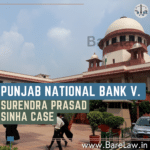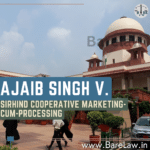
Introduction : CBI vs Anupam J. Kulkarni Case
CBI vs Anupam J. Kulkarni was a landmark court case in Indian law. Pronounced on May 8, 1992 by Justices Reddy and Ahmadi of the Supreme Court, this judgment echoed through the legal fraternity as it laid down important precedents that still remain relevant on issues regarding rights of arrested persons and procedural propriety of agencies in the police force.
Backdrop:
At the outset of the 1990s, India saw evolving jurisprudence where courts were being asked to safeguard individual liberties against growing state powers. In such an environment, CBI vs Anupam J. Kulkarni became a hallmark case highlighting the delicate balance between policing and constitutionalism.
Important Legal Topics:
A number of legal questions around criminal law in India were at stake in this matter. They included validity of sanctions for prosecution, admissibility of evidence and objectivity within which these activities are conducted by CBI concerning corruption claims or forgery allegations. The case was therefore challenging not only because it required complex legal analysis but also due to its implications for how robust India’s legal system is when it comes to delivering justice without failing procedural requirements.
The Verdict And Its Interpretation:
The ruling made on May 8th, 1992 expressed one very significant principle – every person who gets arrested must go before a magistrate within 24 hours from being detained. This provision was based on constitutionally enshrined right to personal liberty free from arbitrary detentions so as ensure a fair procedure guaranteed under Article 21. Therefore, with this said decision judges gave an opportunity everyone caught by police “to have his day” thus further emphasizing that no violation should occur with respect to any rule applied during arrest.
Implications:
This judgement’s effects were widespread since it established that arrestees should be produced within time limits before magistrates thereby avoiding wrongful detentions. It also set benchmarks for other such agencies in terms of constitutional obligations. More so, it resulted into debates among legal practitioners which led to a review of legislation on the rights of accused persons.
The Kidnapping:
A significant part of the case story was the incident involving four diamond traders who were kidnapped in Mumbai. The issue brought into focus the CBI’s role as its probe was handed to them. It illustrated how various complexities impede justice and gave insights about how well laws are designed for enforcement purposes.
Concluding Remarks:
The case of CBI vs Anupam J. Kulkarni is a landmark decision in Indian criminal law. Its importance endures in that it detailed critical legal principles and influenced the development of constitutional policing by the security agencies. These debates about individual rights and police conduct continue to unfold, making this judgment an important milestone marking India’s progress towards a more fair and accountable judicial system.





